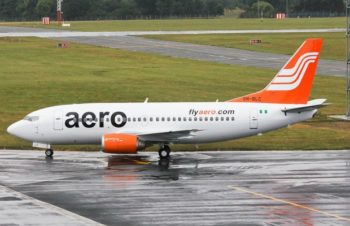
The Accident Investigation Bureau (AIB) on Wednesday said human error caused some of the air mishaps recorded in the Nigerian airspace in the recent past.
The Commissioner of AIB, Akin Olateru, made this known while presenting four more air accident reports to the public on Wednesday.
The bureau had in the last few months released about six reports.
One of the reports was on a Boeing 737 – 500 with registration 5 N -BLE belonging to Aero Contractors Company of Nigeria Limited, a scheduled commercial flight from Lagos to Kaduna.
With 108 passengers and five crew members on board, the incident occurred on June 5 , 2015 .
Others are on the accident involving the Nigerian College of Aviation Technology ’s Socata TBM 850 aircraft near the Kaduna airport on May 21, 2013; Gitto Construczioni Generali Nigeria Limited ’s Bell 407 helicopter accident at the Uyo airport on October 21, 2009; and the International Aviation College’s Diamond DA 42 aircraft accident at the Ilorin airport, on August 18, 2014.
Commenting on the incident involving the NCAT, Olateru explained that the decision of the crew to depart the Nnamdi Azikiwe International Airport, Abuja with the knowledge of weather forecast, caused the accident.
This, he said was compounded by the crew’s failure to follow the guidance provided by the weather radar advisory to avoid the impending adverse weather.
The report said the Uyo mishap was caused by improper maintenance of the oil system, which led to oil starvation and resulting in the failure of the No. 6, 7 and 8 bearings in the power turbine section of the engine, leading to power loss.
Olateru added that the decision of the pilot to continue with the flight from Uyo to the Port Harcourt International Airport without identifying the cause of the transmission chip detector indication was also a major problem.
For the IAC Ilorin incident, the AIB chief said it was the failure of the pilot to adhere to the main wheel installation procedure that prompted the mishap.
The report said that recommendations had been made on the four incidents to the companies involved, the Nigerian Civil Aviation Authority and the aircraft manufacturers, and that appropriate actions had been taken.
On Aero ’s mishap, he said, the AIB recommended that the NCAA should ensure that the activities of flight operations and maintenance departments of the airline are carried out in compliance with the Nigerian Civil Aviation Regulations .
He further argued that NCAA ’s response to Aero ’s investigation was that due to the frequent engine changes, the authority was considering issuing an All Operators’ Letter requiring operators of aircraft to mandatorily inform it of any engine changes prior to accomplishment, adding that this will enable the NCAA to monitor the processes.
The AIB boss said the bureau had published 10 reports in 2017, while 35 safety recommendations had been made.
He added that the bureau was working on six more reports, scheduled to be released in the first quarter of 2018 .
Similarly, he said the bureau had also launched a mobile application known as the AIB app, as part of strategies to reposition the agency and ensure its relevance on the international scene .
The app will simplify the process of reporting incidents and accidents and will extend the bureau’s relationship with users by providing better access to news and updates, he explained.
Copyright Ships & Ports Ltd. Permission to use quotations from this article is granted subject to appropriate credit given to www.shipsandports.com.ng as the source.